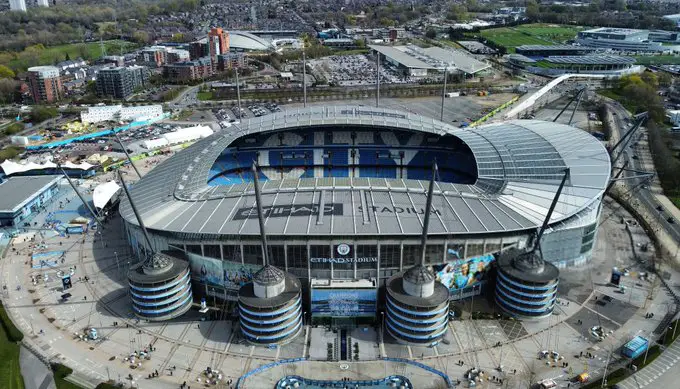The local council has received updated plans from Manchester City FC for a £300 million expansion of Etihad Stadium. With the project, the stadium’s capacity will increase from 54,000 to 60,000. It will thus create a “best-in-class fan experience” and a “year-round entertainment and leisure destination.”
Several interconnected all-weather facilities will be built into the Etihad Stadium. These will be part of the plans centered on an expanded North Stand with a single, larger upper tier above the existing lower tier. A sky bar with views of the field will be constructed above the upper tier. The bar will also have a stadium roof walk experience.
There are also plans for a 400-bed hotel, a new club shop, and a museum. There will also be a covered fan zone with seating for 3,000 people in City Square.
The Etihad Stadium design
Managing Director of Manchester City Operations, Danny Wilson said, “We have been creating concepts and designs for a best-in-class fan experience and year-round entertainment and leisure destination at the Etihad Stadium for several months. We are now happy to have now submitted a planning application to Manchester City Council.
“I would like to take this opportunity to thank our supporters and the local community for their involvement in our recent consultation. They not only filled out the questionnaire, but they also shared their detailed comments and feedback with us, all of which have been carefully reviewed and taken into consideration.
“As with all Club developments, ensuring the benefit to our local community is a key priority. We believe the Etihad Stadium proposals will deliver long-term economic and social opportunities. This is building on the regeneration work delivered in East Manchester by City Football Group since 2008.”
March 2023
Etihad Stadium expansion project to begin in November 2023
Work on the Etihad Stadium expansion will begin in November 2023 if the planning application is approved. Manchester City Football Club hopes to appoint the main contractor this September. The club intends to increase the size of its North Stand’s lower tier and add a single, larger upper tier above it.
The Etihad Stadium’s capacity would increase by 7,700 seats to about 61,000. The North Stand is anticipated to be operational by August 2025, in time for the 2025–26 season. Manchester City also intends to construct a 3,000-capacity fan zone with food and beverage establishments as part of its three-year plan. The proposals include a new club shop, museum, hotel, and start-up space.
Manchester City’s Etihad stadium expansion plan
The club stated that “over £300m will be invested in the east Manchester area” as part of the project. It anticipates that the hotel, office building, and public realm projects, including City Square, will be finished by mid-to-late 2026.
Additionally, any prospective contractors would have to develop “a variety of training and apprenticeship programs for residents in the local community through a legally binding Local Employment Proposal,” it was added. The plans are the subject of a consultation with fans and the neighborhood that will last until March 26, 2023.
Manchester City revealed plans in 2014 to enlarge both the South and North Stands. The plan called to increase the stadium’s capacity to about 60,000. However, only the plans to add a third tier to the South Stand were implemented. Thus, Laing O’Rourke worked on the project, adding only about 6,000 seats.
Read Also: Planning approval received for Vilnius Stadium in Lithuania
The largest stadiums in the Premier League
The Etihad Stadium is the fifth-largest stadium among Premier League clubs. Its rival, Manchester United, holds the top spot at Old Trafford with 74,310 seats. If Manchester City’s expansion of the Etihad Stadium is approved, it will surpass Arsenal’s Emirates Stadium to become the fourth-largest stadium in the Premier League.
The Etihad Stadium is owned by Manchester City Council, which leases it to the football club. The stadium, also known as the City of Manchester Stadium, was initially constructed to host the 2002 Commonwealth Games. Manchester City then relocated there from its previous home at Maine Road in 2003.

Leave a Reply